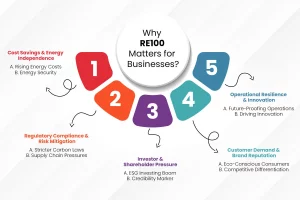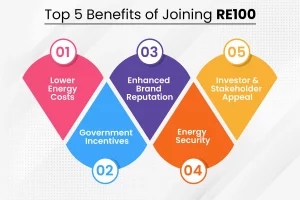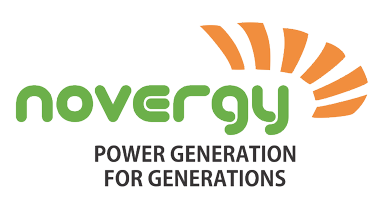What is RE100?
RE100 (Renewable Energy 100%) is a global initiative led by the Climate Group and CDP (Carbon Disclosure Project) to unite businesses committed to 100% renewable electricity.
Launched in 2014, it now includes 400+ companies across 175 markets, from startups to Fortune 500 giants like Apple, Google, and Infosys.
What are the key features?
- Goal: Transition corporate energy use to 100% renewables by 2050 (or earlier).
- Scope: Covers all electricity used in operations, including offices, factories, and data centers.
- Reporting: Members must disclose annual progress publicly.
Why RE100 Matters for Businesses?

Renewable energy 100 isn’t just a sustainability badge—it’s a strategic business decision with far-reaching financial, operational, and reputational benefits.
Here’s why businesses worldwide, from startups to Fortune 500 giants, are racing to join this global initiative:
1. Cost Savings & Energy Independence
-
Rising Energy Costs
Electricity prices have surged globally, with businesses facing 7–15% annual hikes in grid tariffs. Renewable energy, however, offers stable, predictable costs:
- Solar and wind power costs have significantly reduced.
- Below are the links to the reports on how Apple, Infosys, and Google achieved several cost benefits, such as reduced carbon emissions, increased energy efficiency, etc.
Apple: https://shorturl.at/EKFmA
Google: https://shorturl.at/IsFtm
Infosys: https://shorturl.at/RzDp1
-
Energy Security
- Avoid grid failures, fuel shortages, and price volatility.
- In 2021, IKEA launched a program to promote 100% renewable energy in Poland, China, and India. In 2023, due to suitable markets, it expanded into Germany, Lithuania, Italy, etc.
2. Regulatory Compliance & Risk Mitigation
-
Stricter Carbon Laws
- EU Carbon Border Tax: Imposes fees on imports from high-emission industries.
- India’s Carbon Credit Scheme: Penalizes companies exceeding emission limits.
RE100 members stay ahead of regulations, avoiding fines and securing incentives like tax rebates.
-
Supply Chain Pressures
- Corporate Giants Demand Sustainability: Walmart, Amazon, and Unilever require suppliers to adopt renewables.
- Example: Apple mandates its 200+ suppliers to transition to 100% renewable energy by 2030.
3. Investor & Shareholder Pressure
-
ESG Investing Boom
- According to Bloomberg Intelligence, global ESG (environmental, social, and governance) represents a significant portion of the total assets under management.
- Funds like BlackRock and Vanguard prioritize companies with strong sustainability credentials.
-
Credibility Marker
- RE100 members are more likely to attract ESG-focused investors.
- In 2021, Microsoft launched a “100/100/0 clean energy goal” in which the company pledged to power 100% of its electricity consumption, 100% of the time, with zero-carbon energy purchases by 2030, along with the prior commitment to powering 100% of its data centers and facilities globally with renewable energy by 2025.
4. Customer Demand & Brand Reputation
-
Eco-Conscious Consumers
- Global consumers prefer brands committed to sustainability.
- Example: Patagonia’s “Earth First” ethos boosted sales by 30% post-100% renewable energy commitment.
-
Competitive Differentiation
- Renewable Energy 100 members dominate “green rankings” like CDP’s A-List and Corporate Knights’ Global 100.
- Unilever credits its commitment for a 50% rise in brand loyalty.
5. Operational Resilience & Innovation
-
Future-Proofing Operations
- Renewables shield businesses from fossil fuel price spikes (e.g., 2022’s energy crisis).
- Tesla’s Gigafactories run on solar/wind, cutting energy costs by 60%.
-
Driving Innovation
- Green Hydrogen: Tata Steel uses hydrogen to decarbonize steel production.
- AI-Powered Grids: Google employs AI to optimize renewable energy use in data centers.
Top 5 Benefits of Joining RE100

Joining this initiative offers businesses a strategic advantage in today’s competitive and sustainability-driven market.
Here are the key benefits of becoming a member:
-
Lower Energy Costs
Switching to renewable energy sources like solar and wind power helps businesses reduce reliance on expensive grid electricity, leading to long-term savings on energy bills.
-
Government Incentives
Members can access subsidies, tax rebates, and accelerated depreciation benefits offered by governments to encourage the adoption of renewable energy.
-
Enhanced Brand Reputation
Commitment to 100% renewable energy strengthens a company’s image as an eco-conscious leader, attracting environmentally aware customers and partners.
-
Energy Security
Renewable energy systems provide a stable and reliable power supply, reducing vulnerability to grid failures or fossil fuel price fluctuations.
-
Investor and Stakeholder Appeal
Membership signals strong environmental stewardship, making businesses more attractive to ESG-focused investors and aligning with global sustainability standards.
Global & Indian RE100 Companies Leading the Green Revolution
Global Leaders
- Apple: Achieved 100% renewables for global operations in 2018.
- Google: Runs data centers on 5.5 GW of solar/wind energy.
- IKEA: Installed 1.7 million solar panels across stores worldwide.
Indian re100 companies
- Infosys: Targeted 60% renewable energy by 2025 with 125+ cr. of savings annually.
- Tata Motors: Partner with Tata Power Renewable Energy Ltd. to develop a 12MWp solar project at its Pune manufacturing unit.
-
Dalmia Cement: There are biomass plants in several states in India, including Tamil Nadu, Karnataka, Maharashtra, Andhra Pradesh, Uttar Pradesh, Bihar, and Assam.
Case Studies: How Indian RE100 Companies Saved Crores
Case 1: Infosys Solar Power Plant
- Challenge: High electricity costs for IT campuses.
- Solution: Installed 46 MW of solar panels across offices.
- Result: 49.92% reduction in Scope 1 and 2 GHG emissions over the BAU scenario.
Case 2: Dalmia Cement’s Biomass Shift
- Challenge: Rising coal prices and emissions.
- Solution: Replace coal with agricultural waste (biomass).
- Result: 100% renewable energy in more than 5 states.
Case 3: Tata Motors’ Wind Energy Project
- Challenge: Unreliable grid power in Tamil Nadu.
- Solution: Invested in 18 MW wind farms.
- Result: Saves ₹1.8 crore/year with zero downtime.
How to Join RE100: A Step-by-Step Guide for Businesses
Step 1: Energy Audit
- Use tools like TERI’s Energy Audit Toolkit to assess current consumption.
Step 2: Submit Commitment
- Submit a public pledge to the Climate Group via their portal.
Step 3: Transition Plan
- Set milestones: e.g., “30% solar by 2026, 100% by 2030.”
Step 4: Annual Reporting
- Disclose progress in sustainability reports or CDP disclosures.
RE100 in India: Government Support, Challenges & Future Trends
Govt. Support
- Subsidies: 40% for rooftop solar under PM Surya Ghar Yojana.
- Policy: The National Solar Mission targets 100 GW of solar capacity for industries.
Challenges
- High Upfront Costs: A 1 MW solar plant costs ₹4–5 crore.
- Grid Integration: Limited infrastructure for renewable storage.
2025 Trends
- Bifacial Solar Panels: 20% more efficient than traditional panels.
- Green Hydrogen: Companies like Reliance are investing in hydrogen-powered factories.
Latest RE100 Reports: Key Findings for 2024 & 2025
RE100 Annual Report 2024
- A significant number of companies achieved 100% renewable energy globally.
- India is one of the top renewable energy-producing countries.
Key Stats for 2025
- Indian Members: 50+ companies, including Mahindra and Wipro.
- Sector Growth: The IT, manufacturing, and cement industries are primarily represented.

